英语词性变化
英语单词词性转换
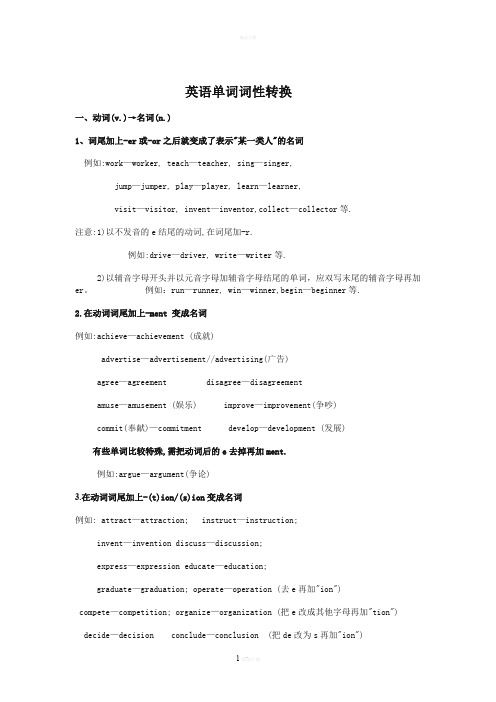
英语单词词性转换一、动词(v.)→名词(n.)1、词尾加上-er或-or之后就变成了表示"某一类人"的名词例如:work—worker, teach—teacher, sing—singer,jump—jumper, play—player, learn—learner,visit—visitor, invent—inventor,collect—collector等.注意:1)以不发音的e结尾的动词,在词尾加-r.例如:drive—driver, write—writer等.2)以辅音字母开头并以元音字母加辅音字母结尾的单词,应双写末尾的辅音字母再加er。
例如:run—runner, win—winner,begin—beginner等.2.在动词词尾加上-ment 变成名词例如:achieve—achievement (成就)advertise—advertisement//advertising(广告)agree—agreement disagree—disagreementamuse—amusement (娱乐) improve—improvement(争吵)commit(奉献)—commitment develop—development (发展)有些单词比较特殊,需把动词后的e去掉再加ment.例如:argue—argument(争论)3.在动词词尾加上-(t)ion/(s)ion变成名词例如: attract—attraction; instruct—instruction;invent—invention discuss—discussion;express—expression educate—education;graduate—graduation; operate—operation (去e再加"ion")compete—competition; organize—organization (把e改成其他字母再加"tion")decide—decision conclude—conclusion (把de改为s再加"ion")describe—description描写,描绘 (这是特例,不规则变化)4.在动词词尾加上-ance变成名词例如: appear—appearance (外貌;出现)perform—performance (演出)accept—acceptance (接受)resist-resistance n.抵抗,阻力5.在动词词尾加-ing变成名词 (方法与动词变为现在分词的方法相同)例如:meet—meeting build—building wait—waitingbathe—bathing say—saying(谚语) mean—meaning注意:以辅音字母开头并以元音字母加辅音字母结尾的单词,应双写末尾的辅音字母再加-ing如:swim—swimming shop—shopping begin—beginning二、动词(v.)→形容词(adj.)1.动词后面加able,以e结尾的动词则去e加able,表示具有此性质,特点或属性.例如: afford-affordable;love-lovable2.动词后面加ed,以e结尾的动词则直接加d,表示被动性的属性或特点.例如: scatter-scattered use-used3不规则的动词则必须记忆,记住其过去分词形式.规律不大,意义同(b).三.名词(n.)→形容词(adj.)1.在名词后面加-y可以变成形容词(尤其是一些与天气有关的名词)例如: rain—rainy, cloud—cloudy, wind—windy, snow—snowy,health—healthy, luck—lucky,anger—angry guilt—guilty(内疚的)tourist—touristy(游客多的) , salt (盐)—salty (咸的)silk(丝绸)—silky(丝绸般的), sleep—sleepy (昏昏欲睡的)注意:1)如果以辅音字母开头并以元音字母加辅音字母结尾,这时应双写辅音字母再加"-y".如: sun—sunny, fun—funny, fog—foggy(有雾的), fur—furry(毛皮的)2)少数以不发音的e结尾的名词变为形容词时,应去掉e再加"-y".如: noise—noisy, ice—icy, shine—shiny(发亮的), taste(口味)—tasty(甜的) 2.名词后面加-ed,以e结尾的直接加d.例如: spot(斑点)—spotted(有斑点的); talent—talented (有天赋的)organize—organized 有组织的; balance—balanced(平衡的)3.一些抽象名词在词尾加-ful可以变为形容词例如:care—careful, thank—thankful, help—helpful,use—useful, meaning—meaningful4.在名词后加-less构成含有否定意义的形容词例如:care—careless(粗心的), use—useless(无用的)hope—hopeless(没希望的),home—homeless(无家可归的)5.一些以-ce结尾的名词,把-ce改为-t变成形容词例如: difference—different, silence—silent, confidence—confident6.在名词后加-ly变为形容词例如: friend—friendly, love—lovely, live---lively7.在名词后加-ous变为形容词例如: danger—dangerous prosperous a 繁荣的(pro 在前+sper 希望+ous)8.名词后面加-al变为形容词例如: music—musical; medicine—medical (这个比较特殊)9名词后面加-able变为形容词,如果以e结尾就去e再加"-able".例如: adjust—adjustable 可调整的 value—valuable有价值的10.名词后面加-en变成形容词例如: wood—wooden 木制的 wool—woolen 羊毛的四.形容词(adj.)→副词(adv.)▲一般在形容词的词尾加-ly可以变成副词例如: quick—quickly, slow—slowly, loud—loudly, sudden—suddenly 等例如:possible—possibly, terrible—terribly欢迎您的下载,资料仅供参考!致力为企业和个人提供合同协议,策划案计划书,学习资料等等打造全网一站式需求。
高中英语2024高考复习词形词性变化汇总(共九组)
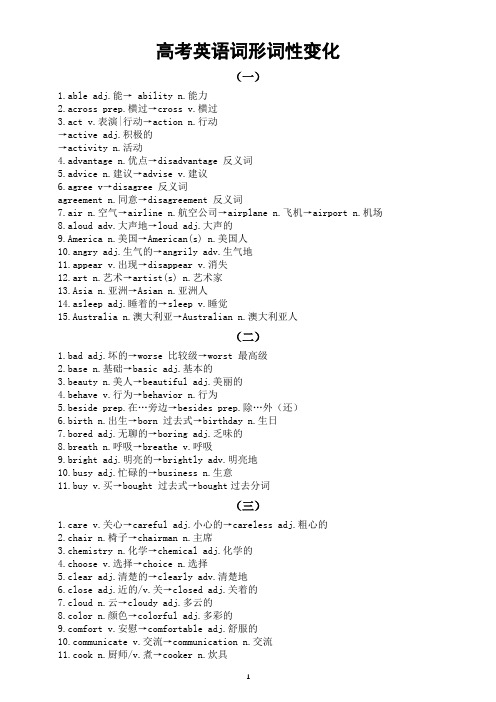
高考英语词形词性变化(一)1.able adj.能→ ability n.能力2.across prep.横过→cross v.横过3.act v.表演|行动→action n.行动→active adj.积极的→activity n.活动4.advantage n.优点→disadvantage 反义词5.advice n.建议→advise v.建议6.agree v→disagree 反义词agreement n.同意→disagreement 反义词7.air n.空气→airline n.航空公司→airplane n.飞机→airport n.机场8.aloud adv.大声地→loud adj.大声的9.America n.美国→American(s) n.美国人10.angry adj.生气的→angrily adv.生气地11.appear v.出现→disappear v.消失12.art n.艺术→artist(s) n.艺术家 n.亚洲→Asian n.亚洲人14.asleep adj.睡着的→sleep v.睡觉15.Australia n.澳大利亚→Australian n.澳大利亚人(二)1.bad adj.坏的→worse 比较级→worst 最高级2.base n.基础→basic adj.基本的3.beauty n.美人→beautiful adj.美丽的4.behave v.行为→behavior n.行为5.beside prep.在…旁边→besides prep.除…外(还)6.birth n.出生→born 过去式→birthday n.生日7.bored adj.无聊的→boring adj.乏味的8.breath n.呼吸→breathe v.呼吸9.bright adj.明亮的→brightly adv.明亮地10.busy adj.忙碌的→business n.生意11.buy v.买→bought 过去式→bought过去分词(三)1.care v.关心→careful adj.小心的→careless adj.粗心的2.chair n.椅子→chairman n.主席3.chemistry n.化学→chemical adj.化学的4.choose v.选择→choice n.选择5.clear adj.清楚的→clearly adv.清楚地6.close adj.近的/v.关→closed adj.关着的7.cloud n.云→cloudy adj.多云的8.color n.颜色→colorful adj.多彩的fort v.安慰→comfortable adj.舒服的municate v.交流→communication n.交流11.cook n.厨师/v.煮→cooker n.炊具12.correct adj.正确的→correctly adv.正确地13.courage n.勇气→encourage v.鼓励→discourage v.阻止(四)1.day n.天→daily adj.日常的2.danger n.危险→dangerous adj.有危险的3.die v.死→died 死(过去式)→dead adj.死了的→dying adj. 快死了的→death n.死亡4.decide v.决定→decision n.决定5.develop v.发展→developed adj.发达的→developing adj.发展中的6.different adj.不同的→difference n.不同点7.difficult adj.难的→difficulty n.困难8.direct adj.直接的/v.指导→indirect adj.间接的→director n.导演→director n.方向9.discover v.发现→cover v.覆盖→discovery n.发现10.discuss v.讨论→discussion n.讨论11.draw v.画→drawer n.抽屉12.drive v.开车→driver n.司机(五)1.east n.东方/adj.东方的→eastern adj.东方的2.easy adj.容易的→easily adv.容易地cate v.教育→education n.教育4.eight num.八→eighteen num.十八→eighth num.第八→eighty num.八十5.electric adj.电动的→electricity n.电→electronic n.电子6.Europe n.欧洲→European adj.欧洲的7.excite v.使兴奋→excited adj.兴奋的→exciting adj.令人兴奋的8.express v.表达→expression n.表达→expressive adj.富有表现力的(六)1.fall v.落→fell 过去式→fallen 过去分词2.far adj.远的→farther 比较级→farthest 最高级3.farm n.农场→farmer n.农民4.fat adj.胖的→fatter 比较级5.feel v.感觉→feeling n.感觉6.five num.五→fifth num.第五→fifty num.五十7.fill v.填满→filled adj.充满的8.first num.第一→one num.一→once 一次9.fly v.飞→flight n.飞行/航班10.foreign adj.外国的→foreigner n.外国人11.friend n.朋友→friendly adj.友好的→friendship n.友谊12.fun n.兴趣→funny adj.有趣的(七)1.half n一半→halves n (复数)2.happy adj 高兴的→happily 高兴地→happiness n 幸福/快乐3.health n 健康→healthy adj 健康的4.hear v 听见→heard v (过去式)→ heard(过去式)5.heavy adj 重的→heavily adv 重地6.high adj 高的→height n 高度7.help v 帮助→helpful adj 有帮助的8.hero n 英雄→heroes (复数)9.hide v 隐藏→hide(过去式)→hidden(过去分词)10.he pron 他→him他(宾)→his他的→himself他自己11.hold v 举行→held 过去式→held过去分词12.home n 家→homeless adj.无家可归的13.hope v.n 希望→hopeful adj 有希望的→hopeless adj. 无望的14.hunger n 饥饿→hungry adj 饥饿的(八)1.ill adj 有病的→illness n 疾病2.important adj重要的→importance n重要性3.impossible adj 不可能的→possible adj 可能的4.invent v发明→inventor n 发明家→invention n发明物5.interest n 兴趣→interesting adj 有趣的→interested adj 感兴趣的6.introduce v 介绍→introduction n 介绍7.invite v 邀请→invitation n 邀请8.kind adj 善良的 n 种类→kindness n 善良9.knife n 小刀→knives (复数)10.know v 知道→knew 过去式→known 过去分词→knowledge n 知识(九)1. lay v 放置→laid过去式→laid过去分词2.lead.v领导→leader.n.领导人3.leaf.n.叶子→leaves. 复数4.little.adj.少→less比较级→least最高级5.lie.躺→lay过去式→lain过去分词6.live.v生活→life n.生活→lively adj.活泼的7.lose.v.丢失→lost过去式→lost过去分词8.love.v.爱→lovely adj.可爱的9.luck.n.运气→lucky adj.好运的→unlucky adj.不幸的→luckily adv.幸运地→unluckily adv.不幸地。
高中英语词性变化

高中英语词性转换变化及其构词法。
一定程度扩充词汇一 . 转化:指由一种词性转化为另一种词性的构词形式。
1. 名词转化为动词:book (n 书— v 预定);seat (n 座位— v 使就位;落座);water (n 水— v 浇水);shoulder (n 肩膀— v 负责任)2. 动词转化为名词:try (v 尝试— n 尝试);look (v 看— n 表情);swim (v 游泳— n 游泳);dream (v 做梦— n 梦)3. 形容词转化为动词:dirty (adj 脏的— v 弄脏);slow (adj 慢的— v 放慢;减慢);right (adj 正确的— v 纠正);dry (adj 干的— v 变干);free (adj 自由的— v 解放;使自由);wrong (adj 错误的— v 弄错;受委屈)4. 形容词转化为名词:dear (adj 昂贵的— n 喜欢的人/ 物);quiet (adj 寂静的— n 寂静);total (adj 全部的— n 总数)5. 其它词类的转化情况:Our classroom faces south. (south:n 南方;南面— adv 向南;朝南)6. 当英语词汇转化时,转化后的词的读音常有变化。
二 . 合成:指由两个或两个以上本身有独立含义的词合在一起组成一个有具体意义的新词的构词形式。
1. 合成形容词的常见构词形式:⑴数词+ 名词a five - year plan (五年计划);first-class products (一级品);second-hand goods (二手货);a four-word (四字成语)⑵数词+ 名词+ed a three - legged bench (三条腿的登子);a one - eyed camel (一只眼的骆驼)⑶数词+ 名词+ 形容词a 20-year-old lady (一位(一位20 岁的女士);a 1,000-metre-long bridge (一座1000 米长的桥)⑷名词+ 现在分词peace-loving (热爱和平的);meat-eating (食肉的);English-speaking (说英语的);history-making (创造历史的)⑸名词+ 过去分词heart-broken (伤心的);man-made (人造的);state-owned (国有的);water-covered (被水覆盖的)⑹形容词+ 名词+ed absent-minded (漫不经心的);blue-eyed (蓝眼睛的);good-tempered (好脾气的);kind-hearted (和善的)⑺形容词+ 现在分词bad-looking (相貌丑陋的);fine-sounding (动听的);easy-going (容易相处的)⑻形容词+ 名词short-term (短期的);part-time (兼职的);high-class (高级的);large-scale (大规模的)⑼副词+ 现在分词hard-working (努力工作的);far-reaching (深远的);ever-lasting (永恒的)⑽副词+ 过去分词well-developed (高度发达的);well-known (著名的);well-trained (训练有素的)⑾其他构词形式的合成形容词all-round (全面的);face-to-face (面对面的);thank-you (感谢的);out-of-date (过时的)2. 合成名词的常见构成形式:①名词+ 名词silkworm (蚕);footprint (脚印);newspaper (报纸);glasshouse (温室);bedroom (卧室)②名词+ 动名词handwriting (书法);sun-bathing (日光浴);sight-seeing (观光)③形容词+ 名词shorthand (速记);hotline (热线);blackboard (黑板)④动名词+ 名词waiting-room (候车室);sleeping-pill (安眠药);writing-desk (写字台);reading-room (阅览室)⑤动词+ 名词pickpocket (扒手);post office (邮局);playground (操场);break-water (防波堤)⑥动词+ 副词get-together (联欢会);break-through (突破);take-off (起飞);lookout (岗哨)⑦副词+ 动词downfall (垮台);overthrow (推翻);outbreak (爆发);income (收入;所得)⑧其他构成形式的合成名词well-being (福利);good-for-nothing (无用之人);by-product (副产品);touch-me-not (含羞草);self-improvement (自我完善);self-criticism (自我批评)注意:合成词如果出现复数形式时通常在其后加-s 或-es ,如by-products,reading-rooms,但应特别注意:passers-by,lookers-on 等词语是在其表达该词中心含义的词上加-s 或-es . 3. 合成动词及其他合成词类:overthrow (推翻);sleep-walk (梦游);undergo (经历);everything (一切);furthermore (而且);forever (永远);maybe (也许)三.派生:指由一个词根加上前缀和(或)后缀构成另一个词的构词形式。
初中英语词性变化归纳
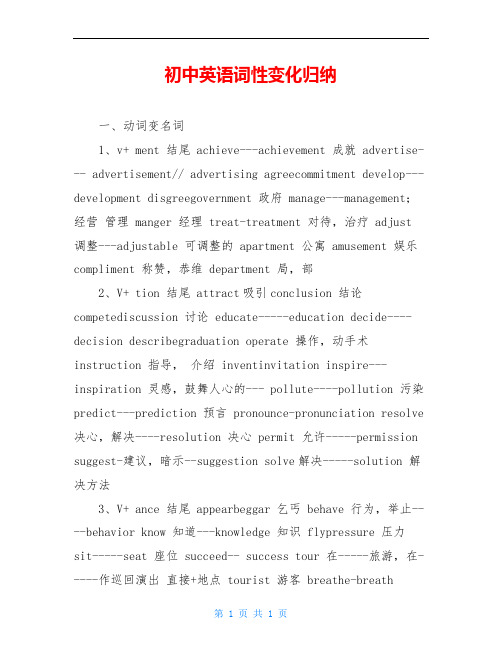
初中英语词性变化归纳一、动词变名词1、v+ ment 结尾 achieve---achievement 成就 advertise--- advertisement// advertising agreecommitment develop---development disgreegovernment 政府 manage---management;经营管理 manger 经理 treat-treatment 对待,治疗 adjust 调整---adjustable 可调整的 apartment 公寓 amusement 娱乐compliment 称赞,恭维 department 局,部2、V+ tion 结尾 attract吸引conclusion 结论competediscussion 讨论 educate-----education decide----decision describegraduation operate 操作,动手术instruction 指导,介绍 inventinvitation inspire---inspiration 灵感,鼓舞人心的--- pollute----pollution 污染predict---prediction 预言 pronounce-pronunciation resolve 决心,解决----resolution 决心 permit 允许-----permission suggest-建议,暗示--suggestion solve解决-----solution 解决方法3、V+ ance 结尾 appearbeggar 乞丐 behave 行为,举止----behavior know 知道---knowledge 知识 flypressure 压力sit-----seat 座位 succeed-- success tour 在-----旅游,在-----作巡回演出直接+地点 tourist 游客 breathe-breath二、名词变形容词1名词+y Anger 生气-----angry hunger---hungry fogwindy rain---rainy snow---snowy sunsilky 丝绸般的 sleep---sleepy 昏昏欲睡的 taste 口味,品味------tasty 甜的 noise-noisy2、名词+ ed 或动词+ed/d balance –balanced 平衡的spot 斑点,地点----spotted 有斑点的 talent-----talented 有天赋的 organized 有组织的 distusted 厌恶的 offended 生气的 crowded 拥挤的 polluted 被污染的 pleased 高兴的3、名词+ ful/less meaningcareful/ careless 小心的;粗心的 help---helpful / helpless hope--hopeless homethankful 充满感激的 peace 和平-- peaceful 平静的,宁静的 playful 顽皮的,爱玩耍的 Value-valueless4、名词+ able comfort---comfortable reason--reasonable believe--believable knowledge---knowledgeable suit 一套-----suitable 合适的 value-valuable价值(v--adj) accept--acceptable接受 believe--believable5、名词+ ous enormous 巨大的 dangernational 国家的internation--international国际化的 education---educational有教育意义的 tradition----traditional 传统的origin起源---original 新颖的;独创的8、名词+ ly friendlovely 可爱的9、+ en 结尾 woodwoolen 羊毛的 gold--golden10、+ness ill--illness Sickness--sick fairness-- fair sadness-- sad10、其他 energy精力---energetic fool 傻子free 空的,免费的 wisdom--wise height 高度loving 慈爱的 death---dead pleasure---pleasant / pleased popularity 流行性形容词 Eastwestern Southbadly brightcasually 随意地clearcompletely 完全 correct---correctly 正确地 final--finally fortunategenerally 一般来讲 loudparticularly politequickly quietreally recent 最近的----recently 最近;近来 hard 难的;努力地---hardly 几乎不 late 迟的specially 专门,特殊地 specific---specifically 特定地,明确地 strongsuddenly突然 usualgently possible---possibly simple--simply 仅仅;只;简单地 terrible---terribly3、辅音字母+ y 变 ily easyheavily happy--happily4、特殊 goodtruly 六、名词---形容词beautifulcarefulcarelesshappyhungry--hungrily healthhealthily luckluckily noisenoisily prideproudly骄傲地 sadnesssadly safety 安全;安全的地方safely silencesuccessfultrueunluckywonderful提高篇讲义I、Complete the sentences with the given words in their proper forms1、Would you mind making a little less _____? They are having a meeting at the moment、 (noisy)2、 The Smiths live on the __________ floor of the highrise、 (nine)3、 All the great __________ are respected(尊敬)by the world、 (invent)4、 My pet is a ______ cat、 She is very lovely、(male)5、I’ll do my homework more __________ next time、(care)6、When you study a foreign language, it’s important to make a good _________、 (begin)7、 Everyone knows such kind of books is ___________ to children、They shouldn’t be sold at any bookstore、(harm)8、 In the past punishment(惩罚)was decided by the university、 The student had no ___________ but to accept it、 (choose)9、 Our teacher told us the ___________ story I had ever heard at yesterday’s class meeting、 (sad)10、 The __________ Lesson is very difficult but very important、 You must learn it by heart、(twelve)11、They looked very _____ in the idea、 (interest)12、 After they got on the bus, they found two_______、 (sit)13、 Help __________ to the fish, everyone、 (you)14、 What we have had is just part of the truth、 We should try to get __________ information about it、 (far)15、 He seemed very _________、 He got a D in the English test、 (happy)17、 Before you start this work, you should try to realize its _________、 (important)18、 March8 is _________ Day、 (woman)19、 This book belongs to you、 Where is _____? (me)20、 The visitors are ________ students、 (main)21、Do you know about the ___ of the book? (write)22、 Can you show me your ___ of coins? (collect)23、 To my ________, I got full marks for maths last week、 (surprised)24、 In this new housing estate there stand a lot of high and magnificent _________、 (build)25、 In winter, most of the rivers and lakes are_________、 It becomes a world of ice、 (freeze)26、 Then he slowly walked _____ the house、 (pass)27、 Do you know who is the __________ of the English contest? (win)28、 Peter is very ______、I’m sure he will c ome to take care of your baby when he’s asked to、 (help)29、 The Yangtze River is the _________ longest river in the world、 (three)30、 __________ to meet all of you here、 (please)31、Now more and more gardens are being built in our __________、 (neighbour)32、It’s very important for us to learn English__________、 (good)33、 Both our teacher and my mother are satisfied with my ___________、 (honest)34、 Oliver Twist ate the cake ___________、 (hungry)35、 Of all the boys, Li Ming studies ______、 (hard)36、 We are all pleased to hear that the _________ went on very well、 ( operate)37、 The children in this kindergarten have been trained to take care of ___________ though they are only six years old、 (they)38、 Could you tell me who will give us a ___________ o n children’s education? (speak)39、 These modern machines work 、 (automatic)40、 This cartoon film is _________ than the one Isaw last Saturday、 (fun)41、Will you please tell me how much the ___________ is? (post)42、 The twin sisters used to be __________ in Hollywood、 (act)43、 Actions speak more _____ than words、 (loud)44、 I am _______ about my schoolwork because Ihavent worked hard this term、 (worry)45、 Your pet dog is so __________ that all of uslike to play with it、 (love)46、 It has been snowing ___ for a whole day、 (heavy)47、 We have been told the ______ of the case、 (true)48、 Have you made your ________ yet? (decide)49、 People from Italy are called ___________、(Italy)50、 I _________ where he comes from、 (wonderful)51、The weather in April is _________, so you’dbetter take more clothes with you、 (change)52、 Ferries come and go on the river as ___________as boats、 (quick)53、 Listen, everybody, we will meet at the ________ of the cinema at4 pm、 (enter)54、 You cannot eat so much fast food, because it is ___________、 (health)55、 It is reported that three __________ have been put into prison、 (Canada)56、 Time flies _________ and never returns、 (swift)57、 We saw her running _________ the street just now、 (cross)58、 Do English people shake hands as often as_______? (Germany)59、We all know that there’s no _________ thing on the moon、 (live)60、 In order to make the trip ____________ for his children, Mr、 Green kept the name of the destination (目的地)a secret、 (excite)61、A _________ team from China will arrive in America next week、 (medicine)62、 This morning I lost my handbag and this afternoon I fell off my bike and broke my leg、 I thinkit is an __________ day、 (luck)63、 Many students are not able to pay their college ________、 (expensive)64、 British people eat a large number of 、 (potato)65、 She seems an __________ girl、 (honesty)66、 We tried all sorts of __________, but they were all useless、 (medical)67、 The digital (数码)camera is one of the __________ of the modern science、 (wonderfully)68、I wouldn’t do business with such a __________ man、 (fool)69、 Carl looks much ________ than before、 (health)70、 I was _________ to meet Jane in a foreign country、 (surprise)71、The mother was _________ to the brave man who had saved her son、 (thank)72、 I happened to meet a group of __________ on my way home yesterday、 (France)73、 The little boy can run a marathon in __________ than three hours、 (little)74、I was told that my class teacher’s daughter would leave __________ school this July、 (second)75、It’s a _________ to have a picnic with all the family members、 (please)76、 The lost calculator has been returned to its__________、 (own)77、 Be sure to let me know whenever you are in__________、 ( dangerous)78、 The completion (完成)of the big bridge made every one of us _________ and happy、 (exciting)79、 The __ is not so good as we expected、 (perform)80、 What a __________ day it is today! Shall we go to have a picnic in the countryside? (sun)81、The tall _________ is one of my father’s best friends、 (art)82、Have you decided to take the headmaster’s__________? (advise)83、 Even __________, he lost his job、 (bad)84、 Please answer the ________ questions、 (follow)85、 Many people became after the fire、 (home)86、 The of the restaurant is quite good、 (serve)87、 _________ speaking, the computer has become an important part of our life、 (general)88、 I thought the _________ was quite dull at yesterday’s party、 (recite)89、 The ________ of the river is still a secret、(long)90、 No one knew why the baby kept _____ 、 (cry)91、Life today is becoming harder and busier, so everyone should have his own way of _____、 (relax)92、 In _________ to hard work, we need some good ways to succeed、 (add)93、 I am fond of _________ fiction、 (scientist)94、It’s __ of you to make such a decision、(wisdom)95、 Quite a few __________ houses have been built for the tourists around the lake、 (wood)96、 The passenger plane landed _____at last after flying in the storm for about one hour、 (safe)97、 My family have been to Beijing __________ to climb the Great Wall、 (two)98、One shouldn’t give up easily if he is determined to __________、 (success)99、Laura’s husband works as a __________ in a bank、 (message)100、 The harder you work; the _________ progress you’ll make、 (great)101、It will ______ rain this afternoon、(impossible)102、 People from different _________ come together to visit the famous museum、 (country)103、 He can do everything on ______ own、 (he)104、。
英语单词词性转变的一般规律
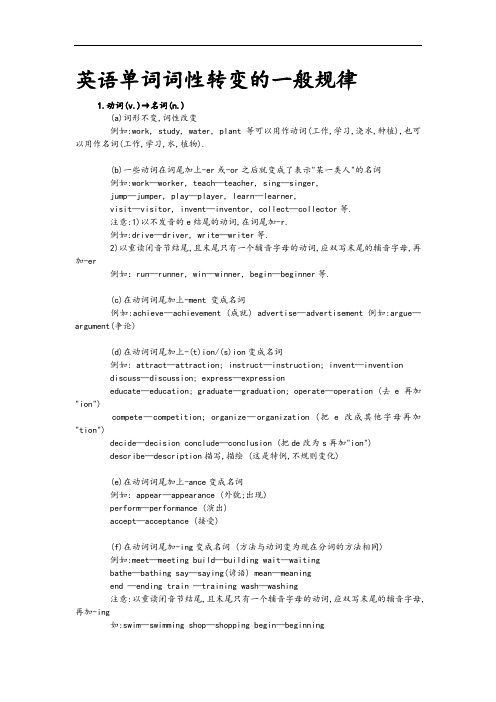
英语单词词性转变的一般规律1.动词(v.)→名词(n.)(a)词形不变,词性改变例如:work, study, water, plant等可以用作动词(工作,学习,浇水,种植),也可以用作名词(工作,学习,水,植物).(b)一些动词在词尾加上-er或-or之后就变成了表示"某一类人"的名词例如:work—worker, teach—teacher, sing—singer,jump—jumper, play—player, learn—learner,visit—visitor, invent—inventor, collect—collector等.注意:1)以不发音的e结尾的动词,在词尾加-r.例如:drive—driver, write—writer等.2)以重读闭音节结尾,且末尾只有一个辅音字母的动词,应双写末尾的辅音字母,再加-er例如:run—runner, win—winner, begin—beginner等.(c)在动词词尾加上-ment 变成名词例如:achieve—achievement (成就) advertise—advertisement例如:argue—argument(争论)(d)在动词词尾加上-(t)ion/(s)ion变成名词例如: attract—attraction; instruct—instruction; invent—inventiondiscuss—discussion; express—expressioneducate—education; graduate—graduation; operate—operation (去e再加"ion")compete—competition; organize—organization (把e改成其他字母再加"tion")decide—decision conclude—conclusion (把de改为s再加"ion")describe—description描写,描绘 (这是特例,不规则变化)(e)在动词词尾加上-ance变成名词例如: appear—appearance (外貌;出现)perform—performance (演出)accept—acceptance (接受)(f)在动词词尾加-ing变成名词 (方法与动词变为现在分词的方法相同)例如:meet—meeting build—building wait—waitingbathe—bathing say—saying(谚语) mean—meaningend —ending train —training wash—washing注意:以重读闭音节结尾,且末尾只有一个辅音字母的动词,应双写末尾的辅音字母,再加-ing如:swim—swimming shop—shopping begin—beginning(g)其他一些比较特殊的变化例如: Beg(乞讨)—beggar(乞丐) behave(行为举止)—behaviorknow(知道)—knowledge(知识) fly—flight (飞行)heat (加热)—heat(热量) hit (撞击)—hit( 轰动一时的人或物,碰撞)mix (混合)—mixture(混合物) press(按,压)—pressure(压力)sit(坐)—seat (座位) succeed—success(成功)tour—tour(旅游)/ tourist (游客)2.动词(v.)→形容词(adj.)(a)动词后面加able,以e结尾的动词则去e加able,表示具有此性质,特点或属性.例如: afford-affordable;love-lovable(b)动词后面加ed,以e结尾的动词则直接加d,表示被动性的属性或特点.例如: scatter-scattereduse-used(c)不规则的动词则必须记忆,记住其过去分词形式.规律不大,意义同(b).3.名词(n.)→形容词(adj.)(a)在名词后面加-y可以变成形容词(尤其是一些与天气有关的名词)例如: rain—rainy, cloud—cloudy, wind—windy, snow—snowy,health—healthy, luck—lucky, anger—angry guilt—guilty(内疚的)tourist—touristy(游客多的) , salt (盐)—salty (咸的)silk(丝绸)—silky(丝绸般的), sleep—sleepy (昏昏欲睡的)注意:1)如果以重读闭音节结尾,且词尾只有一个辅音字母,这时应双写辅音字母再加"-y".如: sun—sunny, fun—funny, fog—foggy(有雾的), fur—furry(毛皮的)2)少数以不发音的e结尾的名词变为形容词时,应去掉e再加"-y".如: noise—noisy, ice—icy, shine—shiny(发亮的), taste(口味)—tasty(甜的)(b)名词后面加-ed,以e结尾的直接加d.例如: spot(斑点)—spotted(有斑点的); talent—talented (有天赋的)organize—organized 有组织的; balance—balanced(平衡的)(c)一些抽象名词在词尾加-ful可以变为形容词例如:care—careful, thank—thankful, help—helpful,use—useful, meaning—meaningful(d)在名词后加-less构成含有否定意义的形容词例如:care—careless(粗心的), use—useless(无用的)hope—hopeless(没希望的),home—homeless(无家可归的)(e)一些以-ce结尾的名词,把-ce改为-t变成形容词例如: difference—different, silence—silent, confidence—confident(f).在名词后加-ly变为形容词例如: friend—friendly, love—lovely, live---lively(g).在名词后加-ous变为形容词例如: danger—dangerous(h)名词后面加-al变为形容词例如: music—musical; medicine—medical (这个比较特殊)(i)名词后面加-able变为形容词,如果以e结尾就去e再加"-able".例如: adjust—adjustable 可调整的value—valuable有价值的(j)名词后面加-en变成形容词例如: wood—wooden 木制的wool—woolen 羊毛的(k)一些表示国家的名词可以在词尾加-ese, -ish或-n构成表示国籍,语言的形容词例如:China—Chinese, Japan—Japanese, England—English,America—American, India—Indian, Australia —Australian(注意Canada—Canadian)4..形容词(adj.)→副词(adv.)▲一般在形容词的词尾加-ly可以变成副词例如: quick—quickly, slow—slowly, loud—loudly, sudden—suddenly 等但是,以下几点值得注意:(a) 一些以"辅音字母+y"结尾的形容词,要把y改为i再加-ly例如: happy—happily, angry—angrily, lucky—luckily, heavy—heavily, noisy—noisily(b) 有些以-ble或-le结尾的形容词,去掉e加-y例如:possible—possibly, terrible—terribly(c)少数以e结尾的形容词,要去掉e再加-ly例如: true—truly但绝大多数以e结尾的形容词仍然直接加-ly 例如: polite—politely, wide—widely(d)以-l结尾的形容词变为副词时要在词尾加-ly,以--ll结尾的才在词尾只加-y.例如: usual—usually, careful—carefully, useful—usefullyfull—fully (以-ll结尾的才只加y)英语词汇后缀系列(一)——形容词后缀able以“-able”结尾的形容词一般有两种情况:(1)v.+able→adj. 以这种方式构成的形容词其意义为“能……的”、“可以(被)……的”、“适合于……的”、“值得……的”等,即有被动含义。
英语词性转换大全
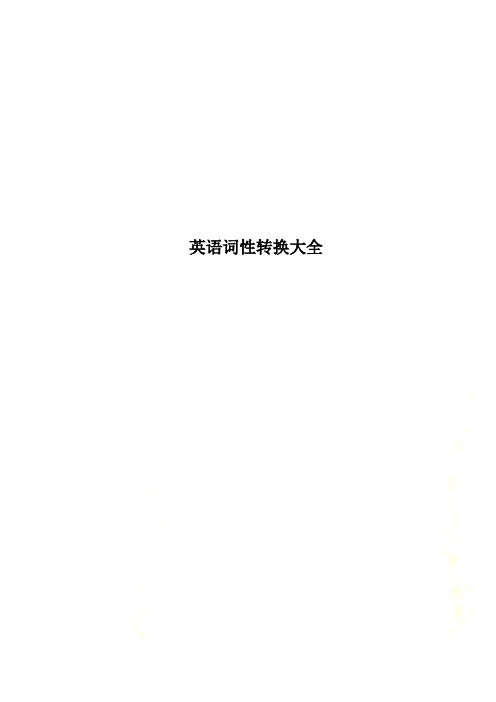
英语词性转换大全英语词性转换1. 名词变形容词(a)在名词后面加-y可以变成形容词(尤其是一些与天气有关的名词)例如:rain—rainy,cloud—cloudy, wind—windy, snow—snowy,health—healthy, luck—lucky,anger—angry guilt—guilty(内疚的) tourist—touristy (游客多的), salt (盐)—salty (咸的)silk(丝绸)—silky(丝绸般的), sleep—sleepy (昏昏欲睡的)注意:1)如果以重读闭音节结尾,且词尾只有一个辅音字母,这时应双写辅音字母再加“-y”。
如: sun—sunny, fun—funny, fog—foggy (有雾的), fur—furry(毛皮的)2)少数以不发音的e结尾的名词变为形容词时,应去掉e再加“-y”。
如: noise—noisy, ice—icy, shine—shiny (发亮的), taste(口味)—tasty(甜的)(b)名词后面加-ed,以e结尾的直接加d。
例如: spot(斑点)—spotted(有斑点的);talent—talented (有天赋的) organize—organized 有组织的; balance—balanced(平衡的)(c)一些抽象名词在词尾加-ful可以变为形容词例如:care—careful, thank—thankful, help —helpful,use—useful, meaning—meaningful(d)在名词后加-less构成含有否定意义的形容词例如:care—careless(粗心的), use—useless (无用的)hope—hopeless(没希望的),home—homeless (无家可归的)(e)一些以-ce结尾的名词,把-ce改为-t变成形容词例如: difference—different, silence—silent, confidence—confident(f)。
英语词性转换大全
英语词性转换1. 名词变形容词(a)在名词后面加-y可以变成形容词(尤其是一些与天气有关的名词)例如:rain—rainy,cloud—cloudy, wind—windy, snow—snowy,health—healthy, luck—lucky,anger—angry guilt—guilty(内疚的) tourist—touristy(游客多的), salt (盐)—salty (咸的)silk(丝绸)—silky(丝绸般的), sleep—sleepy (昏昏欲睡的)注意:1)如果以重读闭音节结尾,且词尾只有一个辅音字母,这时应双写辅音字母再加“-y”。
如: sun—sunny, fun—funny, fog—foggy(有雾的), fur—furry(毛皮的)2)少数以不发音的e结尾的名词变为形容词时,应去掉e再加“-y”。
如: noise—noisy, ice—icy, shine—shiny(发亮的), taste(口味)—tasty(甜的)(b)名词后面加-ed,以e结尾的直接加d。
例如: spot(斑点)—spotted(有斑点的); talent—talented (有天赋的) organize —organized 有组织的; balance—balanced(平衡的)(c)一些抽象名词在词尾加-ful可以变为形容词例如:care—careful, thank—thankful, help—helpful,use—useful, meaning—meaningful(d)在名词后加-less构成含有否定意义的形容词例如:care—careless(粗心的), use—useless(无用的)hope—hopeless(没希望的),home—homeless(无家可归的)(e)一些以-ce结尾的名词,把-ce改为-t变成形容词例如: difference—different, silence—silent, confidence—confident(f)。
英语单词词性转换
英语单词词性转换一、动词v.→名词n.1、词尾加上-er或-or之后就变成了表示"某一类人"的名词例如:work—worker, teach—teacher, sing—singer,jump—jumper, play—player, learn—learner,visit—visitor, invent—inventor,collect—collector等.注意:1以不发音的e结尾的动词,在词尾加-r.例如:drive—driver, write—writer等.2以辅音字母开头并以元音字母加辅音字母结尾的单词,应双写末尾的辅音字母再加er; 例如:run—runner, win—winner,begin—beginner等.2.在动词词尾加上-ment 变成名词例如:achieve—achievement 成就advertise—advertisement例如:argue—argument争论3.在动词词尾加上-tion/sion变成名词例如: attract—attraction; instruct—instruction;invent—invention discuss—discussion;express—expression educate—education;graduate—graduation; operate—operation 去e再加"ion"compete—competition; organize—organization 把e改成其他字母再加"tion"decide—decision conclude—conclusion 把de改为s再加"ion"describe—description描写,描绘这是特例,不规则变化4.在动词词尾加上-ance变成名词例如: appear—appearance 外貌;出现perform—performance 演出accept—acceptance 接受resist-resistance n.抵抗,阻力5.在动词词尾加-ing变成名词方法与动词变为现在分词的方法相同例如:meet—meeting build—building wait—waitingbathe—bathing say—saying谚语 mean—meaning注意:以辅音字母开头并以元音字母加辅音字母结尾的单词,应双写末尾的辅音字母再加-ing 如:swim—swimming shop—shopping begin—beginning二、动词v.→形容词adj.1.动词后面加able,以e结尾的动词则去e加able,表示具有此性质,特点或属性.例如: afford-affordable;love-lovable2.动词后面加ed,以e结尾的动词则直接加d,表示被动性的属性或特点.例如: scatter-scattered use-used3不规则的动词则必须记忆,记住其过去分词形式.规律不大,意义同b.三.名词n.→形容词adj.1.在名词后面加-y可以变成形容词尤其是一些与天气有关的名词例如: rain—rainy, cloud—cloudy, wind—windy, snow—snowy,health—healthy, luck—lucky,anger—angry guilt—guilty内疚的tourist—touristy游客多的 , salt 盐—salty 咸的silk丝绸—silky丝绸般的, sleep—sleepy 昏昏欲睡的注意:1如果以辅音字母开头并以元音字母加辅音字母结尾,这时应双写辅音字母再加"-y".如: sun—sunny, fun—funny, fog—foggy有雾的, fur—furry毛皮的2少数以不发音的e结尾的名词变为形容词时,应去掉e再加"-y".如: noise—noisy, ice—icy, shine—shiny发亮的, taste口味—tasty甜的2.名词后面加-ed,以e结尾的直接加d.例如: spot斑点—spotted有斑点的; talent—talented 有天赋的organize—organized 有组织的; balance—balanced平衡的3.一些抽象名词在词尾加-ful可以变为形容词例如:care—careful, thank—thankful, help—helpful,use—useful, meaning—meaningful4.在名词后加-less构成含有否定意义的形容词例如:care—careless粗心的, use—useless无用的hope—hopeless没希望的,home—homeless无家可归的5.一些以-ce结尾的名词,把-ce改为-t变成形容词例如: difference—different, silence—silent, confidence—confident 6.在名词后加-ly变为形容词例如: friend—friendly, love—lovely, live---lively7.在名词后加-ous变为形容词例如: danger—dangerous prosperous a 繁荣的pro 在前+sper 希望+ous 8.名词后面加-al变为形容词例如: music—musical; medicine—medical 这个比较特殊9名词后面加-able变为形容词,如果以e结尾就去e再加"-able".例如: adjust—adjustable 可调整的 value—valuable有价值的10.名词后面加-en变成形容词例如: wood—wooden 木制的 wool—woolen 羊毛的四.形容词adj.→副词adv.▲一般在形容词的词尾加-ly可以变成副词例如: quick—quickly, slow—slowly, loud—loudly, sudden—suddenly 等例如:possible—possibly, terrible—terribly。
英语单词词性转换
英语单词词性转换一、动词(v.)→名词(n.)1、词尾加上-er或-or之后就变成了表示"某一类人"的名词例如:work—worker, teach—teacher, sing—singer,jump—jumper, play—player, learn—learner,visit—visitor, invent—inventor,collect—collector等.注意:1)以不发音的e结尾的动词,在词尾加-r.例如:drive—driver, write—writer等.2)以辅音字母开头并以元音字母加辅音字母结尾的单词,应双写末尾的辅音字母再加er。
例如:run—runner, win—winner,begin—beginner等.2.在动词词尾加上-ment 变成名词例如:achieve—achievement (成就)advertise—advertisement例如:argue—argument(争论)3.在动词词尾加上-(t)ion/(s)ion变成名词例如: attract—attraction; instruct—instruction;invent—invention discuss—discussion;express—expression educate—education;graduate—graduation; operate—operation (去e再加"ion")compete—competition; organize—organization (把e改成其他字母再加"tion")decide—decision conclude—conclusion (把de改为s再加"ion")describe—description描写,描绘 (这是特例,不规则变化)4.在动词词尾加上-ance变成名词例如: appear—appearance (外貌;出现)perform—performance (演出)accept—acceptance (接受)resist-resistance n.抵抗,阻力5.在动词词尾加-ing变成名词 (方法与动词变为现在分词的方法相同)例如:meet—meeting build—building wait—waitingbathe—bathing say—saying(谚语) mean—meaning注意:以辅音字母开头并以元音字母加辅音字母结尾的单词,应双写末尾的辅音字母再加-ing如:swim—swimming shop—shopping begin—beginning二、动词(v.)→形容词(adj.)1.动词后面加able,以e结尾的动词则去e加able,表示具有此性质,特点或属性.例如: afford-affordable;love-lovable2.动词后面加ed,以e结尾的动词则直接加d,表示被动性的属性或特点.例如: scatter-scattered use-used3不规则的动词则必须记忆,记住其过去分词形式.规律不大,意义同(b).三.名词(n.)→形容词(adj.)1.在名词后面加-y可以变成形容词(尤其是一些与天气有关的名词)例如: rain—rainy, cloud—cloudy, wind—windy, snow—snowy,health—healthy, luck—lucky,anger—angry guilt—guilty(内疚的)tourist—touristy(游客多的) , salt (盐)—salty (咸的)silk(丝绸)—silky(丝绸般的), sleep—sleepy (昏昏欲睡的)注意:1)如果以辅音字母开头并以元音字母加辅音字母结尾,这时应双写辅音字母再加"-y".如: sun—sunny, fun—funny, fog—foggy(有雾的), fur—furry(毛皮的)2)少数以不发音的e结尾的名词变为形容词时,应去掉e再加"-y".如: noise—noisy, ice—icy, shine—shiny(发亮的), taste(口味)—tasty(甜的) 2.名词后面加-ed,以e结尾的直接加d.例如: spot(斑点)—spotted(有斑点的); talent—talented (有天赋的)organize—organized 有组织的; balance—balanced(平衡的)3.一些抽象名词在词尾加-ful可以变为形容词例如:care—careful, thank—thankful, help—helpful,use—useful, meaning—meaningful4.在名词后加-less构成含有否定意义的形容词例如:care—careless(粗心的), use—useless(无用的)hope—hopeless(没希望的),home—homeless(无家可归的)5.一些以-ce结尾的名词,把-ce改为-t变成形容词例如: difference—different, silence—silent, confidence—confident6.在名词后加-ly变为形容词例如: friend—friendly, love—lovely, live---lively7.在名词后加-ous变为形容词例如: danger—dangerous prosperous a 繁荣的(pro 在前+sper 希望+ous)8.名词后面加-al变为形容词例如: music—musical; medicine—medical (这个比较特殊)9名词后面加-able变为形容词,如果以e结尾就去e再加"-able".例如: adjust—adjustable 可调整的 value—valuable有价值的10.名词后面加-en变成形容词例如: wood—wooden 木制的 wool—woolen 羊毛的四.形容词(adj.)→副词(adv.)▲一般在形容词的词尾加-ly可以变成副词例如: quick—quickly, slow—slowly, loud—loudly, sudden—suddenly 等例如:possible—possibly, terrible—terribly。
高中英语高考词汇词性变化规律:动词类变化
高考词汇词性变化规律:动词类变化词性变化之动词类1.动词+后缀-y变为名词deliver —delivery 运送discover —discovery 发现recover — recovery 康复;恢复2.动词+后缀-ing变为名词begin —beginning 开始;开端build —building 建筑〔物〕cross—crossing 十字路口end—ending 结局;结尾engine —engineering 工程feel—feeling 感觉hear—hearing 听力market — marketing 促销meet —meeting 会议paint —painting 绘画;油画spend—spending 花销suffer—suffering 苦难train—training 练习;培养3.动词+后缀-ment变为名词acquire —acquirement n.取得accomplish —accomplishment 成就achieve —achievement 成就adjust —adjustment 调整;调节amuse—amusement 愉快;快乐;消遣announce —announcement 宣告;述说appoint —appointment 约会;预约;任命argue—argument 争论arrange —arrangement 安排assess —assessment 评估assign —assignment 分配;任务astonish —astonishment 惊讶develop —development 开展disappoint —disappointment 失望embarrass —embarrassment 为难employ —employment 雇用enjoy—enjoyment 享受;欢乐entertain —entertainment 款待;娱乐equip—equipment 设备establish —establishment 建立govern —government 统治;政府improve —improvement 提升judge—judgement 判断move - movement 运动;移动punish -punishment 惩罚settle-settlement 定居;解决state-statement 陈述;说明4.动词+后缀-ive变为形容词act-active 积极的attract -attractive 吸引人的cooperate -cooperative 合作的impress -impressive给人印象深刻的protect - protective 保护的relate -relative 相关的sense-sensitive 敏感的object-objective 客观的negative消极的passive被动的positive积极的subjective 主观的5.动词+后缀-able变为形容词accept —acceptable 可接受的adjust —adjustable 可调节的admire —admirable 令人钦佩的afford —affordable 负担得起的change —changeable 易变的comfort —comfortable 舒服的consider —considerable 重要的;相当大的desire—desirable值得做的;可取的enjoy—enjoyable令人愉快的favour—favourable赞成的;有利的forget —forgettable 健忘的honour — honourable 可敬的;荣耀的reach — reachable可获得的;可到达的reason —reasonable 合理的rely—reliable可靠的;可信赖的remark — remarkable 不平凡的suit—suitable 适宜的understand —understandable 可理解的value —valuable 珍贵的6.动词+后缀-ed变为形容词absorb—absorbed专心的;聚精会神的accustom —accustomed 习惯的balance —balanced 平衡的bury—buried 专心的complicate —complicated 复杂的determine —determined 坚决的;有决心的devote —devoted 忠实的experience —experienced 有经验的learn—learned 博学的limit—limited 有限的organize —organized 有组织的suppose —supposed 应该的relate —related 相关的skill—skilled 熟练的unite—united联合的;统一的7.动词+后缀-ing/ + -ed变为形容词amuse—amusing好笑的;有趣的—amused愉快的astonish —astonishing 令人惊讶的—astonished 感到惊讶的bore — boring 令人厌烦的—bored 厌烦的confuse —confusing 令人迷惑的—confused 感到迷惑的convince —convincing 令人信服的—convinced 坚信不移的depress —depressing 令人沮丧的—depressed 沮丧的disappoint —disappointed 失望的—disappointing 令人失望的disturb—disturbing 令人不安的;引起烦恼的—disturbed 扰乱的;精神失常的embarrass —embarrassing 令人为难的一embarrassed 为难的excite—exciting 令人兴奋的—excited 兴奋的frighten —frightening 令人害怕的—frightened 害怕的relax — relaxing使人放松的—relaxed轻松的satisfy—satisfying 令人满意的—satisfied 对满意的shock—shocking 令人震惊的—shocked 震惊的surprise —surprising 令人吃惊的—surprised 吃惊的tire—tiring令人疲劳的—tired疲劳的8.动词+后缀-tion变为名词accelerate —acceleration 加速accumulate —accumulation 积累adapt—adaptation 适应;改编addict—addiction 沉溺;嗜好admire —admiration 羡慕advocate —advocation 拥护apply—application 申请appreciate —appreciation 感谢;欣赏assume —assumption 假定;设想celebrate —celebration 庆祝classify—classification 分类;归类combine —combination 联合congratulate —congratulation 祝贺construct —construction 建筑物consume —consumption 消费contradict —contradiction 反驳contribute —contribution 奉献cooperate —cooperation 合作correct —correction 改正;纠正create—creation 创造;创立declare —declaration 宣言;公告decorate —decoration 装饰decorate —decoration 装饰determine —determination 决心digest —digestion 消化elect—election 竞选;选举erupt—eruption 火山爆发evaluate —evaluation 评估exhibit—exhibition 展览;展览会expect —expectation 期望;期待fascinate —fascination 魅力;入迷graduate —graduation 毕业graduate —graduation 毕业hesitate —hesitation 犹豫;踌躇imagine —imagination 想象immigrate —immigration 迁移;移居indicate —indication 指示;暗示infect—infection 传染interrupt —interruption 中断object—objection 反对occupy —occupation 占领;占据organize —organization 组织pollute —pollution 污染predict —prediction 预言prepare —preparation 准备protect — protection 保护recommend —recommendation 推荐;介绍reflect—reflection 思考;反映regulate —regulation 规那么;规章reject — rejection 拒绝;抛弃relax — relaxation 放松satisfy —satisfaction 满意;满足starve—starvation 挨饿;饿死substitute —substitution 代替;取代translate —translation 译transport —transportation 交通9.动词+后缀-ure变为名词press — pressure 压力please—pleasure 乐事;快乐expose —exposure 暴露;揭发fail—failure 失败mix—mixture 混合物10.动词+后缀-sion变为名词admit—admission 容许;成认permit — permission 允许impress —impression 印象express —expression 表情;表达revise —revision 复习possess —possession 拥有conclude —conclusion 结论confuse —confusion 困惑;混淆decide —decision 决定11.动词/形容词+后缀-ance变为名词guide—guidance 指导tolerate —tolerance 宽容ignore—ignorance 无知;愚昧appear—appearance 出现important —importance 重要〔性〕elegant —elegance 优雅大方assist —assistance 援助resist— resistance 反抗guide—guidance 指导annoy—annoyance 恼怒10。
- 1、下载文档前请自行甄别文档内容的完整性,平台不提供额外的编辑、内容补充、找答案等附加服务。
- 2、"仅部分预览"的文档,不可在线预览部分如存在完整性等问题,可反馈申请退款(可完整预览的文档不适用该条件!)。
- 3、如文档侵犯您的权益,请联系客服反馈,我们会尽快为您处理(人工客服工作时间:9:00-18:30)。
• 这类动词的规则当然 必须是以字母-d结尾 的了。多数是-end这
样的结尾。这里把 build也归入了这一类 了。而tend 和mend属 于规则变化的动词
有-ow,-aw,这些字母组合的动词,过去式中 把这些组合改成-ew,过去分词在动词原形上
再加字母-n
• blow---blew---blown • grow---grew---grown • know---knew---known • throw---threw---thrown • draw---drew---drawn • withdraw-withdrew-
misled
• 这类动词也是以字母d或者-t结尾,中间的 字母组合多数是-ee, 当然这里把shoot和 lead作为这一类归纳 进去了。
把原形动词的最后一个字母-d改成-t
• send---sent----sent • lend---lent----lent • bend---bent---bent • spend---spent---spent • build---built----built
住,停留)
• spell----spelt----spelt • spill----spilt---spilt(溢出,
洒,使...流出 )
• 这一类动词也有一个特点, 那就是有字母组合-ee或 者—ll;同样的,也并不是 说有这样的字母组合的不 规则动词都是这样的变形 了。
•
flee----fled----fled,也
• 此外,以-ing结尾的不 规则动词,还有一种 变化方式是将字母-i改 成-u,过去式和过去 分词一致,例如:
• sting----stung---stung
• swing----swung--swung
不规则动词以-m,-n,-l,-r结尾的,过去式和过 去分词在原形动词词尾加-t或者-d
• mean---meant----meant • lean—leant---leant • learn---learnt----learnt • dream---dreamt---dreamt • burn-----burnt-----burnt • deal-----dealt-----dealt • spoil----spoilt---spoilt • hear----heard----heard
基本符合这个规则,我们
把它归入此类,不过它的 过去式和过去分词是在词 尾加-d.
省略原形动词中两个相同字母中的 其中一个,
• speed---sped---sped • feed----fed-----fed • bleed---bled---bled • meet----met-----met • shoot----shot----shot • lead-----led----led • mislead----misled----
过去式和过去分词都 有-aught的,我们也把 它们归入了此类
•
teach----taught---
--taught
•
catch----caught---
-caught
动词以元音字母-i加辅音字母加不发音的-e结尾的, 一般是在过去式中将字母改成-o,过去分词在原形
动词基础上加-n,或者双写这个辅音字母再加-n
过去式和过去分词都有-ought的
• think-thought--thought • fight--fought--fought • buy--bought--bought • bring-brought-brought • seek--sought---sought
• 另外有两个动词,原 形动词以-ch结尾的,
• arise----arose-----arisen • rise-----rose------risen • ride-----rode-----ridden • write----wrote----written • drive----drove-----driven • strive----strove-----striven • give-----gave----given
• sew----sewed----sewn
含有字母组合-ind的动词,在过去 式和过去分词中都变成-ound
• find----found---found • wind--wound--wound
• 当然,这一类动词 中也有一些例外,比 如,mind就是一个规 则变化的动词。
有字母组合-in或者-ing或者-ink的动词,过 去式把字母-i变成-a,过去分词中把-i变成-u
• begin--began---begun • sing----sang-----sung • ring----rang------rung • spring-sprang-sprung
(弹起,弹出, ) • sink---sank-----sunk • drink-----drank----
drunk • swim---swam---swum
withdrawn
• 这里特别要提醒同学们注 意的是,flew—flown并不 是动词flow的过去式和过 去分词,而是动词fly的过 去式和过去分词,而动词 flow是一个规则动词,它 的过去式和过去分词是
flowed---flowed:
• fly---flew---flown
• flow---flowed---flowed
省略原形动词中两个相同的字母中
的其中一个,然后在词尾叫-t
ห้องสมุดไป่ตู้
• weep---wept---wept(流 泪,哭泣 )
• sleep---slept---slept • sweep---swept---swept
(扫除,席卷 ) • feel---felt---felt • kneel---knelt---knelt • smell---smelt---smelt • dwell---dwelt---dwelt(居
• 另外,有-ow字母组合的动词slow 也是规则 变化。另一些的有-ow,--ew字母组合的不规 则动词变化是过去式加-ed,过去分词在原 形动词的基础上加-n,例如:
• show---showed---shown • sow---sowed---sown(播种,散布 ) • mow---mowed---mown(割草,扫射, )
